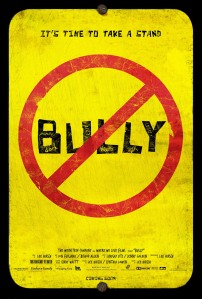By: Addison Wylie
People hear statistics about how frequent bullying is in the school system but, for the most part, it’s remained a problem that’s been sitting on the back burner.
However, after the recent extremes bullying has caused (including youth suicides), Filmmaker Lee Hirsch has made Bully, a documentary that gives audiences an intimate look at how the issue is handled in schools located in Georgia, Iowa, Mississippi, and Oklahoma as well as the upsetting outcomes and the attempts to halt bullying found in those same communities.
Hirsch’s film starts with the events leading up to the tragic demise of student Tyler Long. His coping parents claim that Tyler was a normal kid. In home footage of Tyler as a young boy growing up all the way to secondary school, we can see this too.
When we learn more about Tyler’s death as well as another suicide by a different student, Ty Smalley, it’s hard not to be emotionally invested.
The same can be said for when we’re introduced to other students like Alex, a student having a hard time fitting in and reading into the bullying that happens to him as friendly exchanges. A punch to the head is a high five to him.
Kelby Johnson is another student who steals our heart. Unfortunately, her homosexuality is a red flag to many students, parents, and teachers. When her parents offer to move her to another school, she refuses and tells them, “that would mean they’ve won.” When the film isn’t discussing how often bullying takes place, Bully also depicts how often homophobia still plagues.
What Hirsch has done so well with his film is that he hasn’t exploited any of his subjects. The camera never stays on Tyler’s mourning parents for too long but also offers them enough time to walk through the good memories they have of him.
The interviews and cutaways with the students are shot in the same way; even if Hirsch (also taking on the role as Cinematographer) has one too many shots where the visuals snap in and out of focus. In fact, the individual interview sessions with the students almost serve as a therapeutic process from students like Alex, who surprisingly tells the camera more than he would tell his parents. These sessions are never awkward and we never feel like we’re seeing or hearing too much.
Hirsch isn’t abusing the cathartic honesty his subjects are giving to him. The intimacy gives us more of a hands-on understanding to how people, young and old, process bullying. In fact, Hirsch has a kindness towards them and the safety of his subjects is always on his mind. He may have shot footage of Alex being smacked around but when it gets to a certain point, Hirsch acknowledges Alex’s parents and shows them the footage.
The documentary also isn’t edited in a tricky way. For instance, audiences will hate the Principal who is on display here because of how she handles the harsh bullying in her school. But, all of her moments on camera are one-shot takes. What she is saying hasn’t been doctored or taken out of context.
We can’t help but feel our stomach tangle itself into knots as we see her lecture a kid after a recess. A kid who had just been rough-housed, been called, in his words, a “p-u-s-s-y”, but refused to shake the bully’s hand to put the situation to rest. The Principal is aware of all the name-calling and violence but lets the bully go back to class and proceeds to give the other student a talk about why it’s important to shake another’s hand.
The Principal gazes out the hall windows during recess and confesses that she has no idea how to take care of the problem. She almost deems it as an inevitable issue that isn’t worthy of lifting a finger for. Bullying may be a large issue to tackle but to be so uninvolved with it and look at it behind closed doors with such a defeated attitude is absolute carelessness. It angers us to see the issue handled this way and it’s even more frustrating to hold back from name-calling and being a bully towards the Principal.
Bully doesn’t just simply show how common bullying is and the ignorance the follows but it also shows us growth. A scene at a parent-teacher conference with Tyler’s parents talking about their passed son and how damaging bullying is, strikes an intriguing and emotional chord because of how everyone is coming together within the community and facing the administration with questions like, “why aren’t the bullies responsible for the suicides of their victims?” When we see communities rising together and holding events dedicated to the lives lost, we can’t help but feel that this issue will slowly be stopped one day at a time.
Bully may be a hard film to watch at times because of how upsetting and frustrating the stories are, but, it’s that ability to pull those emotions out of an audience that makes the documentary an important and relevant piece of work. Hirsch is able to juggle all of the stories while maintaining emotional focus on each story. It certainly is a strong example of great documentary filmmaking.



Leave a comment